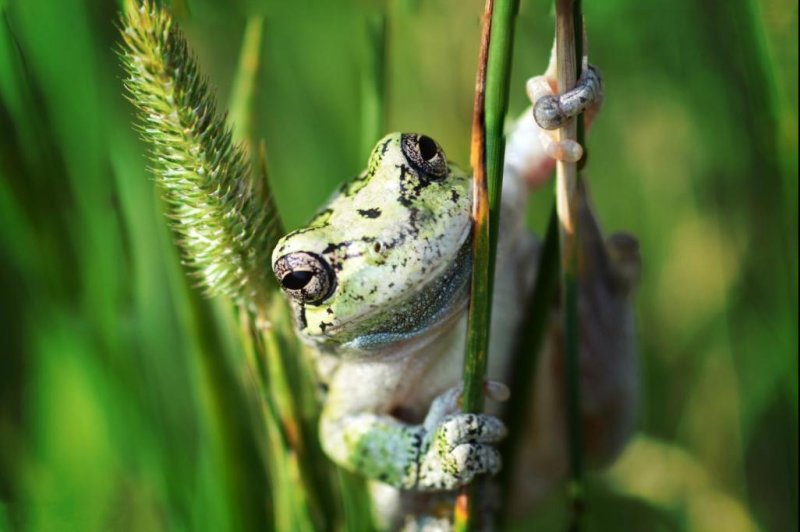Researchers found wood frogs with pesticide tolerance were more susceptible to parasites. Photo by Brian Mattes/Rensselaer Polytechnic Institute
Aug. 15 (UPI) -- Resistance to one sort of affliction may make frogs more susceptible to another, new research shows.
Amphibians, with their extra-porous skin and fragile ecosystems, are especially vulnerable to a variety of contaminants. But some species, like wood frogs, have adapted to the presence of pesticides.
However, new research out of the Rensselaer Polytechnic Institute suggests frogs with a tolerance for pesticides are more likely to become infected by parasitic worms.
"We have only recently begun to understand that amphibians can rapidly evolve tolerance to chemicals like pesticides, which on the surface is good news," Rick Relyea, a professor of biological sciences at Rensselaer, said in a news release. "But now comes the bad news: With that tolerance there is a tradeoff, which is that they become more susceptible to parasites that, in the case of ranavirus, can wipe out entire amphibian populations."
Previous research has shown frogs living close to agricultural lands -- where pesticide concentrations are strongest -- tend to develop tolerance through genes passed down from their parents. The adaptation is passed from one generation to another.
Frogs living farther away can also develop a tolerance if they're exposed to low levels of pesticides during their formative stages. The latter process is known as "inducible tolerance."
Unfortunately, pesticides aren't amphibians' only threat. Parasites can also harm amphibian populations.
Researchers at Rensselaer, as well as Binghamton and Purdue universities, studied the impact of a pair of parasites -- trematode worms and ranavirus -- on 15 wood frog populations. Scientists found frog populations living farther from farms with an inducible tolerance to pesticides were more likely to be infected with trematodes. Frogs living closer to farms and with a higher pesticide tolerance were more likely to be susceptible to ranavirus.
"Our results suggest that it is not enough to consider the effects of contaminants or parasites in isolation. Nature is complex," said Jessica Hua, an assistant professor at Binghamton. "Not only do different stressors interact in ways that can be difficult to predict, but evolutionary responses to one stressor can shape amphibian responses to other stressors."
Researchers published their findings this week in the journal Evolutionary Applications.















